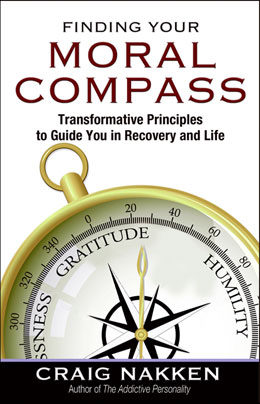
"Knowing our strengths and limitations, and operating from that knowledge, creates both self-confidence and humility."

Other titles you may like.

Addictive Personality:
Understanding the Addictive Process and Compulsive Behavior

Addictive Thinking:
Understanding Self-Deception

The Spiritual Self:
Reflection on Recovery and God
Visit Recovery Road to view and
listen to all the episodes.
Episode 228 -- July 7, 2022
Arrogance vs. Humility
Sometimes we can be too sure of ourselves. Confidence can be a good thing, of course. Who doesn't want to feel good? Part of a healthy recovery, however, is learning to hold a more realistic and right-sized view of who we are. We must be careful not to be so sure of ourselves that we judge or dismiss others without acknowledging our own faults. The recovery principle of humility can help.
In Finding Your Moral Compass: Transformative Principles to Guide You in Recovery and Life, Craig Nakken outlines forty-one basic principles, paired as positive and negative counterparts, that guide our behavior. He offers these pairs as tools for taking inventory, discovering options, and making better choices—especially when our choices are not very clear.
The following excerpt explores the continuum between humility and arrogance, and how each of these impulses shows up in our lives. Nakken identifies humility, which is often seen as weakness, as a key source of spiritual power. The honest awareness of our truth can help us destroy the distorted views of reality that kept us stuck. Humility teaches us that we are not perfect—and that is perfectly fine. Accepting this will enable us to ask for help when we need it, make amends when we hurt others, and grow in our recovery.
This excerpt has been edited for brevity.
Arrogance
Knowing our strengths and limitations, and operating from that knowledge, creates both self-confidence and humility.
Arrogance is the lack of this knowledge—an exaggerated, distorted view of who we are, what we know, and what we are capable of. Arrogant people may also have a distorted view of what they feel they deserve or are entitled to.
Arrogant people often seek to be untouchable. They are often alone and treat their loneliness as badge of courage. Randy's comments demonstrate this: "The reason I have few friends is others' fear of my intelligence. When they're around me, they get tired of being wrong." Yet arrogance is essentially a lie, because it rejects reality in favor of a false view of ourselves. Worst of all, arrogance stifles spiritual growth, because it won't allow us to say some of the most important sentences in life: "I was wrong," "I'm sorry," and "Please help me."
Humility
Acquiring greater humility is the central theme of spiritual growth. Truths always lead us back to humility—to how little we know and how much we can learn. Humility is protective. Without humility, we can easily fall back into instinctual reactions.
Humility binds us to positive Spiritual Principles, especially during times of adversity and times of doubt. The more humility we possess, the stronger the bond we have with these Principles.
Our instinctual side experiences humility as a loss of power instead of an avenue to ethical power. It sees humility as humiliation or weakness or submission. Yet humility is actually one of the most direct roads to ethical power. When we are humble, we see our imperfections as roads to the Divine.
Humility both creates and is the result of correct perspective. Through humble eyes, we see the suffering of the world. Through humble eyes, we see how our own limitations create a need—and an opening—for others. Through humble eyes, we see that all things are connected, interwoven, interdependent.
Humility creates willingness and spiritual freedom, enabling us to heal what we can, learn what we can, and be of service wherever there is a need.
Questions for contemplation:- In what times and places are you most likely to become arrogant? What about this arrogance feels good to you? What do you do if someone challenges you when you're feeling and acting arrogant? In what ways does this arrogance help you? How does it hurt you? How does it hurt others?
- Think back to a moment in your life when you were deeply humbled. Did you embrace humility or resist it? What effects did being humbled have on you? On others around you? Are there any areas of your life that you need to bring more humility to now?
- As of right now, where do you place yourself on the continuum from arrogance to humility?
About the Author:
CRAIG M. NAKKEN, MSW, LCSW, LMFT is a family therapist, author, international lecturer, and trainer who specializes in recovery from addictions. Craig began his counseling career in 1972 at Pharm House in Minneapolis, where he worked with addicts who came in off the street. He served as Pharm House's director of outpatient treatment services from 1975 to 1977
© 2011 by Craig Nakken
All rights reserved

